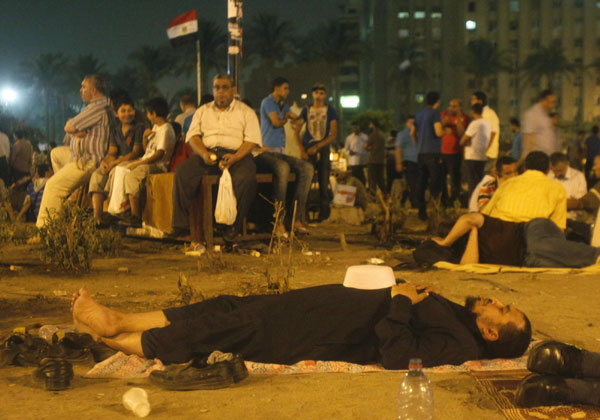Egypt delays announcing run-off results
 |
|
A protester sleeps as other protesters gather during a sit-in at Tahrir Square in Cairo June 20, 2012.?[Photo/Agencies] |
CAIRO - Egypt's presidential election commission decided on Wednesday to delay the announcement of presidential run-off results, originally scheduled for Thursday, until the completion of reviewing all appeals from both rivals.
"The commission is continuing to consider all the appeals and finish reviewing all submitted documents of the electoral process requires more time, before the results will be announced," said Higher Presidential Elections Commission President Farouq Sultan.
The statement didn't specify a date for issuing final results of the presidential run-off. But the commission's secretary- general Hatem Bagato reportedly said the results will likely be announced on Saturday or Sunday.
More than 400 appeals had been filed until Tuesday night.
The commission spent five hours on Wednesday to listen to the lawyers of Mohamed Morsi, candidate of the Muslim Brotherhood and of Ahmed Shafiq, the last prime minister of ex-President Hosni Mubarak era.
The appeals included objections against some alleged phenomenon of the electoral process, such as inconsistencies between numbers of ballots and voters, votes from dead citizens, repetition of votes and some balloting stations' employees influencing voters in favor of a particular candidate.
Shafiq's lawyer alleged a huge number of marked ballots for Morsi were found in 14 governorates.
In the run-off vote which ended on Sunday, Morsi claimed lead with 52 percent of the votes while Shafiq's campaign said the ex- premier is the winner with 51.5 percent.
Meanwhile, thousands of protestors continued to gather on Wednesday evening in downtown Cairo's Tahrir Square, the epicenter of last year's anti-government protests which led to the end of the rule of Mubarak. They were against the newly-issued supplementary constitutional declaration issued by the ruling military council. The document stipulated the powers of the military and president in the upcoming transitional period.
The Supreme Council of the Armed Forces, which took over power in February 2011, has promised to transfer power to an elected president by June 30. Yet the new president will assume office without a new constitution and parliament.



























